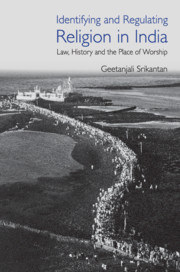Book contents
- Frontmatter
- Contents
- Acknowledgements
- Introduction
- 1 Secularisation and Theologisation: The Making of ‘Hindu Law’ and British Colonialism
- 2 The Role of Legal Hermeneutics as Secularisation in the Formation of Anglo-Muhammadan Law
- 3 Influences and Confluences: The Theological Foundations of Western Property Law and the Place of Worship in India
- 4 Identifying ‘Doctrine’: Tracing Theologisation in Legal Narratives of the Place of Worship in India
- 5 Rethinking Definitions: Hinduism as Religion in the Indian Supreme Court
- Conclusion
- Glossary
- List of Cases
- Bibliography
- Index
Conclusion
Published online by Cambridge University Press: 30 April 2020
- Frontmatter
- Contents
- Acknowledgements
- Introduction
- 1 Secularisation and Theologisation: The Making of ‘Hindu Law’ and British Colonialism
- 2 The Role of Legal Hermeneutics as Secularisation in the Formation of Anglo-Muhammadan Law
- 3 Influences and Confluences: The Theological Foundations of Western Property Law and the Place of Worship in India
- 4 Identifying ‘Doctrine’: Tracing Theologisation in Legal Narratives of the Place of Worship in India
- 5 Rethinking Definitions: Hinduism as Religion in the Indian Supreme Court
- Conclusion
- Glossary
- List of Cases
- Bibliography
- Index
Summary
The introduction to this book highlighted certain problems which were law's inability to define religion and the dearth of approaches to resolving this problem. Contemporary scholarship has focused on the inability of courts to define religion due to the lack of will in implementing the political principle of secularism. Legal reasoning has not served the demands of the secular state. According to legal scholars, the methods of application in legal reasoning have been defective. Through a historical analysis, this book points out that inherited systems of legal thought derived from Western intellectual history and the Christian theological framework are behind the impasse in the legal regulation of religion in India.
In its analysis, it points out that the domain of the regulation of religion is a recent one, the distinction between the religious and the secular arising during the colonial period. The preceding pages have not just established the colonial roots of the basis of the contemporary regulation of religion but that the distinction between the religious and secular legal systems may be a false one. It has also shown the differing ways in which law carries out the process of religion-making or theologisation. As Chapter 1 demonstrates, ‘Hindu law’ appears as an entity in the nineteenth century as an attempt by the British to govern ‘Hinduism’. Such governance involved the importation of secular legal reasoning influenced by the Christian theological framework. This made the creation of religious and secular legal systems parallel developments. It was only with the secular that the religious was produced. As observed in Chapter 2, similar developments took place, with secular legal hermeneutics playing a role in making Indian Muslims subjects of both law and religion.
What is the significance of imported Western frameworks of legal reasoning? The contribution of this book is that it shows how these frameworks bring about ways of conceiving and perceiving religion. The conceptualisation of a general law that is juxtaposed against customary practice has a direct impact on how one considers practices or texts of a community as valid in law. The introduction of the ideas of divine law, natural law and human law as systems of reconciliation allowed a particular conceptualisation of religion to be produced as being valid in law. The application of this form of legal reasoning as a universal way of understanding the customs and practices of Indians has a discursive impact.
- Type
- Chapter
- Information
- Identifying and Regulating Religion in IndiaLaw, History and the Place of Worship, pp. 206 - 212Publisher: Cambridge University PressPrint publication year: 2020



